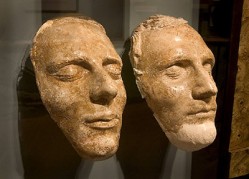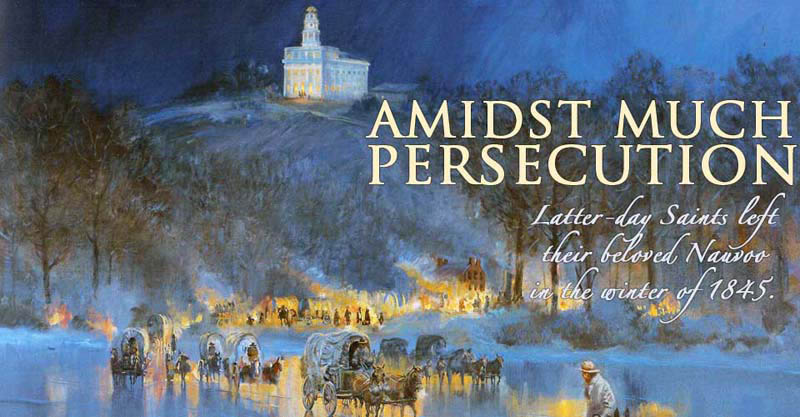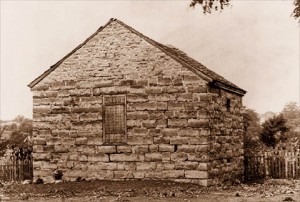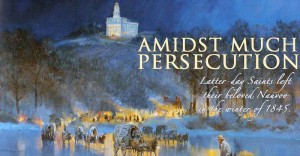A Peacemaker
Hyrum’s mild manner and impeachable character allowed him to serve as a peacemaker even in his own family. At a time when his younger brother William became very upset with Joseph after being rebuked by him, Hyrum tried to bring William around. Joseph recorded that Hyrum “was perfectly satisfied with the course I had taken in rebuking William in his wickedness, but he is wounded to the very soul, because of the conduct of William; and although he experiences the tender feelings of a brother towards him, yet he can but look upon his conduct as an abomination in the sight of God” (Hyrum Smith: A Life of Integrity, Jeffrey S. O’Driscoll, 142). Though it took some time and more hard words from William, the brothers and family as a whole became reconciled. Having kept a cool head, Hyrum was able to bring peace back to the relationship after William acknowledged his faults and returned to the family. In situations regarding gossip or misunderstandings, Hyrum counseled the Saints to seek out the individual who had wronged them and seek to settle the matter between the two of them. He knew from observation that anger and malice led to more hate.
In October 1837, Hyrum was once again away from home on a Church assignment. Jerusha was pregnant with their sixth child and gave birth to her on October 2. Sadly, Jerusha passed away less than two weeks later, leaving five living children whose father was away from home. This took a heavy toll on Hyrum, who had loved his wife very much. Just over two months later, on Hyrum’s return home, Joseph counseled him with a revelation from God to marry again without delay so his children would not be motherless. The Lord counseled Hyrum to marry Mary Fielding, who was thirty-six at the time. Mary and Hyrum had a strong marriage and she continued to support him in his Church callings, just as Jerusha had done. They married on December 24, 1837.
Hyrum’s kind nature prompted him to take many people into his home. In fact, when he left Kirtland, Ohio, in 1838, he recorded that his family consisted of ten individuals. He did not identify those who were not his immediate family members, but at least one stayed under his family’s roof after their relocation to the Salt Lake Valley after Hyrum’s death. Such a character as Hyrum’s could hardly go unnoticed by those outside of the Church. Said one Presbyterian minister from Kirtland, “Whatever other Mormons may have been, Hyrum was a perfect gentleman” (Hyrum Smith: A Life of Integrity, Jeffrey S. O’Driscoll, 167).
Imprisonment in Liberty Jail
In October 1838, the Saints were driven from Missouri by the infamous extermination order from Governor Lilburn W. Boggs. Joseph was betrayed by a leader in the Mormon militia and was arrested. The army, led by Colonel Hinkle, soon went to Hyrum’s house and arrested him as well. Torn from his family when they needed his help so much, Hyrum spent the next five and a half months imprisoned with Joseph while their families, along with all the Saints, were expelled from their homes and the state in the middle of winter. Though his life was in danger, Hyrum’s faith never wavered. He knew his cause was just and that God was on his side. As the prisoners were being moved for their trial, they were exposed to the elements as well as severe abuse. They were put through a sham trial and imprisoned in Liberty Jail in Clay County. To add insult to injury, some of the leaders of the mobs fighting against the Church were former Church leaders turned apostate, many of whom had once been close friends of Hyrum and Joseph. Olivery Cowdery, who had also left the Church, ransacked Hyrum’s home in his absence, showing forged bills of pretended debts, robbing the already poor and prostrate family in their defenseless state. During this time, however, Joseph and Hyrum grew even closer. Several attempts to escape failed, but finally their jailers took pity on them, knowing of their innocence as well as the corruption of the government in their court proceedings. In transit, the jailers allowed the prisoners to escape. Hryum later recalled this experience, stating his gratitude for his faithfulness in adversity.
Soon after their experience with angry apostates and their incarceration, Hyrum was called to serve as the assistant president of the Church under Joseph. He took on many leadership responsibilities when Joseph was absent, but always stepped down when Joseph was there to preside. At times like this, Hyrum gained a greater appreciation of the burden Joseph carried in the mantel of being the living prophet on the earth.
Hyrum was always ready to plead for mercy on behalf of those who came to Church leaders seeking forgiveness. One such penitent was Orson Hyde, for whom Joseph recommended disciplinary action. However, upon hearing that both Hyrum and Heber C. Kimball pleaded on Hyde’s behalf, he withdrew his motion. Such was the degree to which Joseph held Hyrum’s good opinion that he granted Sidney Rigdon an extended probation, even after Rigdon had worked openly against the prophet. Though Hyrum’s mercy was complete, in this case his judgment was ill founded. Sidney eventually left the Church.
Death of His Father
After the death of Joseph Smith, Sr., on September 14, 1840, Hyrum was called to fill his father’s role as the Church Patriarch, giving patriarchal blessings to worthy Church members who requested them. This life-long calling required even more time, but Hyrum was always willing to set aside what he was doing to fulfill the work of the Lord and to comfort individuals who need bolstering of faith. Said the Lord of Hyrum, “Blessed is my servant Hyrum Smith; for I, the Lord, love him because of the integrity of his heart, and because he loveth that which is right before me” (D&C 124:91).
After the Saints moved yet again, this time to Nauvoo, Hyrum became a brevet major general in the Nauvoo Legion. Hyrum continued to function in his role as Church Patriarch. At Joseph’s request, Hyrum wrote a letter of reprimand to the Saints in Kirtland about collecting money for a religious newspaper when the direction from the Lord clearly stated all money which could be spared to go to the completion of the Nauvoo Temple. Hyrum’s language was unmistakable and direct while remaining unoffensive. Hyrum knew the importance of completing this temple, which would allow the Lord to shower down eternal blessings upon faithful Saints.
Not only could Hyrum be direct in his correction of others; he could stand correction himself when it was necessary. At a meeting in Joseph’s home, Hyrum spoke on the importance of the scriptures, admonishing that “We must take them as our guide alone.” After Hyrum sat down, Brigham Young, the president of the Twelve, stood, piled the books of scripture on top of each other, and said, “I would not give the ashes of a rye straw for all those books for my salvation without the living oracles. I should follow and obey the living oracles for my salvation instead of anything else” (Hyrum Smith: A Life of Integrity, Jeffrey S. O’Driscoll, 250–251). Instead of being offended or growing angry, Hyrum stood and acknowledged his oversight in not including the living oracles and asked pardon. Such was his character.
Hyrum instructed the brethren to preach nothing but the basic principles of the gospel to the world: faith, repentance, baptism, and the laying on of hands for the gift of the Holy Ghost. He taught:
“Beware what you teach! For the mysteries of God are not given to all men; and unto those to whom they are given they are placed under restrictions to impart only such as God will command them; and the residue is to be kept in a faithful breast, otherwise he will be brought under condemnation. by this God will prove his faithful servants, who will be called and numbered with the chosen” (Hyrum Smith: A Life of Integrity, Jeffrey S. O’Driscoll, 318).
The Martyrdom
As persecution in Nauvoo increased, the city council declared the Nauvoo Expositor a nuisance due to its libelous slander. Since the charter which had been granted to the city gave the city council the right declare nuisances and to “prevent and remove the same” (Hyrum Smith: A Life of Integrity, Jeffrey S. O’Driscoll, 336). The council’s actions were within legal bounds and were, they believed, for the safety of the people. However, this act set into motion events which culminated in the martyrdom. Thinking only their lives were in danger, Joseph and Hyrum decided to leave for the West, expecting the Saints to join them later, and hoping that this action would stem the tide of violence coming against the Saints. When they were requested to return, Hryum remembered the power his blessing had given him to choose to lay down his life, even though it meant leaving his family. Both Hyrum and Joseph knew that a return meant death, but they both went willingly, sealing their testimonies with their blood.
Four men were present in Carthage Jail the morning of June 27, 1844. Joseph and Hyrum Smith were both killed by an angry mob of men, but Willard Richards and John Taylor escaped alive. Much has been said of Joseph’s sacrifices, but an editorial which appeared in the Times and Seasons offered this eulogy on behalf of Hyrum:

Mormon Joseph and Hyrum Smith
“In thus descanting upon the glory of General Joseph Smith and the cowardly disgrace of his assassins, let his noble minded brother Hyrum have no less honor shown him: he lived so far beyond the ordinary walk of man, that even the tongue of the vilest slanderer could not touch his repuation. He lived godly and he died godly, and his murderers will yet have to confess that it would have been better for them to have a mill stone tied to them, and they cast into the depths of the sea, and remain there while eternity goes and eternity comes, than to have robbed that noble man of heaven, of his life” (Hyrum Smith: A Life of Integrity, Jeffrey S. O’Driscoll, 359).
Twitter •




 Watch a video about the restoration of the gospel on lds.org
Watch a video about the restoration of the gospel on lds.org